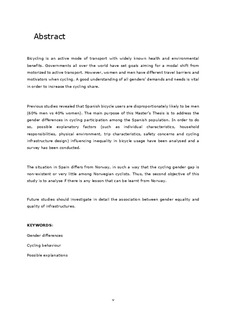| dc.description.abstract | Bicycling is an active mode of transport with widely known health and environmental benefits. Governments all over the world have set goals aiming for a modal shift from motorized to active transport. However, women and men have different travel barriers and motivators when cycling. A good understanding of all genders’ demands and needs is vital in order to increase the cycling share.
Previous studies revealed that Spanish bicycle users are disproportionately likely to be men (60% men vs 40% women). The main purpose of this Master’s Thesis is to address the gender differences in cycling participation among the Spanish population. In order to do so, possible explanatory factors (such as individual characteristics, household responsibilities, physical environment, trip characteristics, safety concerns and cycling infrastructure design) influencing inequality in bicycle usage have been analysed and a survey has been conducted.
The situation in Spain differs from Norway, in such a way that the cycling gender gap is non-existent or very little among Norwegian cyclists. Thus, the second objective of this study is to analyse if there is any lesson that can be learnt from Norway.
Future studies should investigate in detail the association between gender equality and quality of infrastructures.
KEYWORDS:
Gender differences
Cycling behaviour
Possible explanations | |
